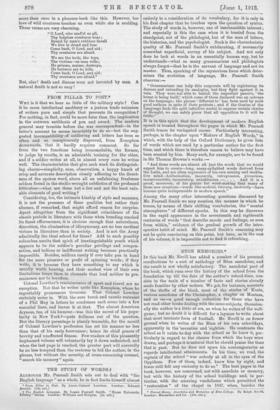FROM PILLAR TO POST.* WHY is it that we hear
so little of the military style P Can it be mere intellectual snobbery or a jealous trade unionism of writers pure and simple that prevents its recognition P For nothing, in fact, could be more false than the implication in the outworn antithesis of pen and sword. The modern general may tremble before the war correspondent—in the latter's account he seems invariably to do so—but the sug- gested incompatibility of soldiering and letters has been so often and so conspicuously disproved, from Xenophon downwards, that it hardly requires comment. So far from the two functions being irreconcilable, the former, to judge by results, is an admirable training for the other, and if a soldier writes at all, in almost every case he writes well. The characteristics that give such work its distinguish. ing charm—simplicity, ease, observation, a happy knack of crisp and accurate description closely adhering to the direct- ness of the spoken word, above all an unfaltering freshness seldom found in the studio-wrought subtleties of the professed Zitt6rateter—what are these but a few and not the least valu- able elements of good writing P Considering, too, the intimate kinship of style and manners, it is not the presence of these qualities but rather their absence, if remarked, that might afford reason for surprise. Apart altogether from the significant coincidence of the classic periods in literature with those when breeding reached its finest efflorescence, it is obvious enough that naturalness, discretion, the elimination of idiosyncrasy, are no lees cardinal virtues in literature than in society. And is not the Army admittedly the ideal school for these? Add to such possibly colourless merits that spirit of inextinguishable youth which appears to be the soldier's peculiar privilege and compen- sation, and tedious or indifferent writing beco►nes practically impossible. Besides, soldiers rarely if over take pen in hand for the mere pleasure or profit of spinning words ; if they write, it is because they have something to say which is usually worth hearing, and their modest view of their own limitations keeps them in channels that lead neither to pre- eminence nor to boredom.
Colonel Lowther's reminiscences of sport and travel are no exception. Not that he writes quite like Xenophon, whom he regrettably pronounces tiresome. That Colonel Lowther certainly never is. With the sure touch and caustic restraint of a Phil May in letters he condenses each scene into a few essential lines, and leaves it at that. The almost American dryness, too, of his humour—was this the secret of his popu- larity in New York P—puts dullness out of the question. But the literary parentage is plainly traceable, for the mould of Colonel Lowther's profession has set his manner no less than that of his early forerunner; hence its chief graces of brevity and unaffected fitness. Few readers of this pleasantly haphazard volume will voluntarily lay it down unfinished, and when the last page is reached, the greater part will assuredly be no less tempted than the reviewer to bid the author, in the phrase, but without the severity, of cross-examining counsel, "search his memory" again.






































 Previous page
Previous page